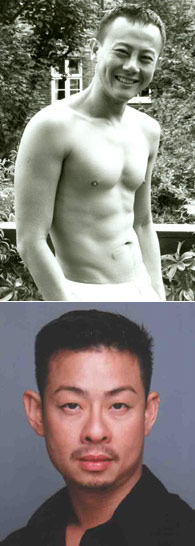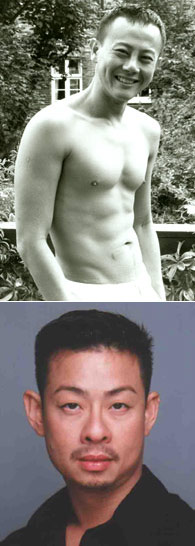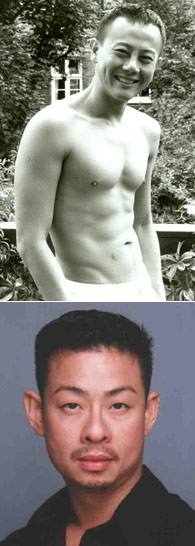It's a muggy afternoon in Singapore as I trek down to the Olio Dome caf� to interview Ivan Heng and Chowee Leow, the director and actor respectively of An Occasional Orchid, a monologue about a Malaysian transvestite in London. Having been performed in various cities such as London, Amsterdam, Hong Kong and Kuala Lumpur, the play has finally arrived in Singapore like a prodigal daughter, into the backyard of the world's second largest exporter of orchids.

Chowee Leow (top) and Ivan Heng
Pleased with my first botanical metaphor of the day, I arrive at the table of Vanda Miss Heng and Dendrobium Miss Leow, who have just finished a spot of lunch while waiting for me. Heng, dressed in a floral shirt, with his trademark thespian goatee, greets me warmly, his eyes scrunching up just enough to betray a naughty glint. Leow, with his ferret-like adroitness and a (very straight) shirt worn over a singlet, looks like the complete antithesis of Zoe [the transvestite in the play], his coiffed, high-heeled Dragon Lady persona: they are as different as a buffed rodent and a lissom reptile.
Heng is no stranger to Singapore audiences, last appearing in drag as Emily of Emerald Hill, arguably the most iconoclastic re-interpretation of Singapore's most canonical play. He's paid his dues as a formidable actor whose past credits include baring his posterior for a Singaporean production of M. Butterfly (the first instance of rear nudity in the Garden City). He is currently artistic director of one-year-old theatre company, Wild Rice Productions. Leow, on the other hand, is a new face to local theatregoers, although the Malaysia-born full-time actor has been a professional actor in the UK for more than 15 years.
After being told by the two to calm down and catch my breath (sagely advice--the hallmark of those who age with dignity--although I'm not suggesting the pair are in any way of advanced years), I launch straight into a fascinating interview on horticultural and intercultural experiences; titular transplantations and tit transplants.
Alfian: I have to do this stupid bit for groundwork, but I want you to know I'd rather talk about flowers. How old are the both of you?

Chowee Leow (top) and Ivan Heng
Chowee: He's the ageless beauty. I want to be timeless mind.
Alfian: So how did you two dream up of this play?
Chowee: We first met in 1995, where I watched Ivan performing in his one-man play, Journey West. I was blown away, and approached Ivan after the show.
Ivan: He was wearing this glittering plastic blue top. Like something from outer space.
Alfian: What was that? Sounds like Boney M.
Chowee: PVC. It was my plastic disco dolly phase!
Ivan: And later we met again, at this theatre marathon where they staged plays like The Lesbian Vampires of Sodom and The Tragic and Horrible Life of the Singing Nun. Then we went to SoHo for coffee, and there was so much to share. The experiences of two people in a foreign country, the displacement, the similar childhood. We talked about our mothers' recipes, about living in London as a double minority.
Chowee: Another seed that grew into the play was us visiting the Kew Gardens, where we saw these two old ladies fawning over spider orchids (the kinds you could get at the wet market here for fifty cents), going, 'how lovely, how splendiferous!' It crystallised for me the exoticisation of something simply because it is different.
Ivan: Also, at that time, there was the London One Play festival, which held a competition for scripts, and as playwrights it gave us a deadline to work with. We spent 14 weeks on the play, but in between we partied like crazy. On Sundays we would attend talks on orchids, we studied the consctruction of Wonderbras, played with Barbies.
Alfian: So what are some of things you explore in the play?
Chowee: One of the things that we looked into was of being Asian men and the way we are looked at. Asian men, in the West, are seen as lesser and weaker than their Caucasian counterparts. Sexually, they've got low market value, unless you're talking about Rice Queens. On the other hand, Asian women are the ones framed as being more desirable, alluring, mysterious. So as a gay man, if you took this persona of an Asian Lady, the same men who put you down will now ogle at you as an object of desire. It gives you a sense of empowerment, although it's a distorted kind of empowerment. An illusion. A fantasy.
Ivan: It is, because we're actually constructing Suzie Wong. But in the play, we are conscious about the fact that we're playing with these stereotypes as much as we try to subvert them.
Alfian: That's interesting, because I would have thought that an alternative strategy of empowerment is to actually move away from the stereotype of the ivory-skinned, skinny, eager-to-please island-twink from the land of smiles and coconut oil massage. Who's a submissive bottom big-moaner of course.
Chowee: That's true, because now a lot of Asian gay men are reclaiming power for themselves, who can now declare that, 'I'm now as big, and as steroid-pumped as you'. But that again falls into a certain kind of insecurity, into conforming to the dominant view of what constitutes attractiveness in the gay circle. These second generation party clones, with their tight tank tops and short hair.
Alfian: Are still taking their cues from the West. But what was the first generation?
Chowee: The Tom of Finland leather daddies of San Francisco. Moustaches and hairy chests.
Alfian: The metaphor of the orchid you use in the play is interesting. I haven't seen the play yet, but the irony has always struck me that in Singapore, where the national flower is an orchid, we're still very afraid of hybridity. And the fact is that some of the most beautiful orchids are hybrids. Over here we're afraid of anything we can't box in and safely categorise. We're obsessed with protecting the status quo, which translates into an intolerance of heterogeneity.

Chowee Leow (top) and Ivan Heng
Alfian: We've talked about the intolerance of the status quo to alternative sexualities. But do you think gay men themselves have a certain prejudice against transgenders?
Chowee: We have to admit that the gay scene can be quite fascist. I think some believe that transgenders threaten the image of gay men, the ones who'd go around saying 'we are men, we're not women.' Transgenders become subversive that way, they put a splinter in the eye of the gay male image. But I believe any gay man would jump at the chance of putting on make-up, sequins and a feather boa.
Alfian: And why is that?
Chowee: Because it's such a kick to get attention from all these straight men who you could get to look at you only in your wildest dreams. They start to give you wolf-whistles and lascivious stares. And some of these tranny-chasers are gorgeous to-die-for men. I've met one who's this blond sea captain. But it's wrong to think that only gay men cross-dress. I've met heterosexual men who are manual workers and truck drivers but who drag, with their bad wigs and bad make-up. They would never in a million years sleep with another 'real' man, but they would sleep with each other. And I've met many trannyfuckers who actually want to get humped, which is why they go for chicks with dicks.
Alfian: Hmmm. One of the reasons censors cite when they prevent a play from being staged is that quite often they champion certain values and lifestyles within a setting that makes them acceptable. The weird gets packaged in an attractive wrapping, there's humour, there's empathy, and society's demons become humanised. I know at least some people who think that staging gay plays is an act of propaganda: you tell a one-sided story using an arsenal of theatrical devices to win the audience over to your camp (pun intended). Do you think in such cases it's fair to say that theatre is dangerous?
Ivan: There is never any danger in theatre. I don't wish to talk about the danger of theatre but the power of theatre. The only people who would view theatre as dangerous are the ones who feel threatened when they are challenged. And theatre has the power to show that maybe the devil is among us, that as much as we want to judge and condemn a villain on stage we do identify that some of his traits are in us. And talk of theatre as dangerous can only happen in Singapore, where the Minister of State for the Arts is also the Minister of Defence. The Arts becomes a matter of National Security.
Alfian: So, okay, you're not averse to putting all these divergent sexualities on stage, and you show how these things are actually very real and human. But where do you draw the line?
Ivan: I don't want to take a moral stand, but I suppose I'll stop at condoning carnal relations with animals.
Chowee: And children.
Alfian: I've noticed that your theatre company, Wild Rice, has been playing around a lot with gender politics. A woman actress performed No Parking on Odd Days and The Coffin is too Big for the Hole, plays originally written for a male character. You yourself did Emily in drag. Is this a direction you see the company taking?
Ivan: I see myself more as a humanist than a feminist. I'm interested in identifying social injustices and putting them on stage, under the glare of bright lights. Theatre is a space which allows us to see beyond our limits, to see a bigger piece of sky. An Occasional Orchid might have a very specific subject matter, about someone really on the absolute margins of society, but it's got universal resonances.
Chowee: At the end of one of my performances someone came up to me and said, 'you've written a play about a German housewife'. And that was a nice reminder that we weren't just dealing with narrow and myopic issues.
Ivan: I can say that 'Orchid' is a transgendered play, but it's also a family show. In fact, I want it to be an 'A' level text for students. Our young needs to know.
Date : 17 April to 13 May 2001
Venue : The Room Upstairs, 42 Waterloo Street, Singapore
TicketCharge Hotline : 296-2929
R(A) 18 years and above only











 Printable Version
Printable Version









